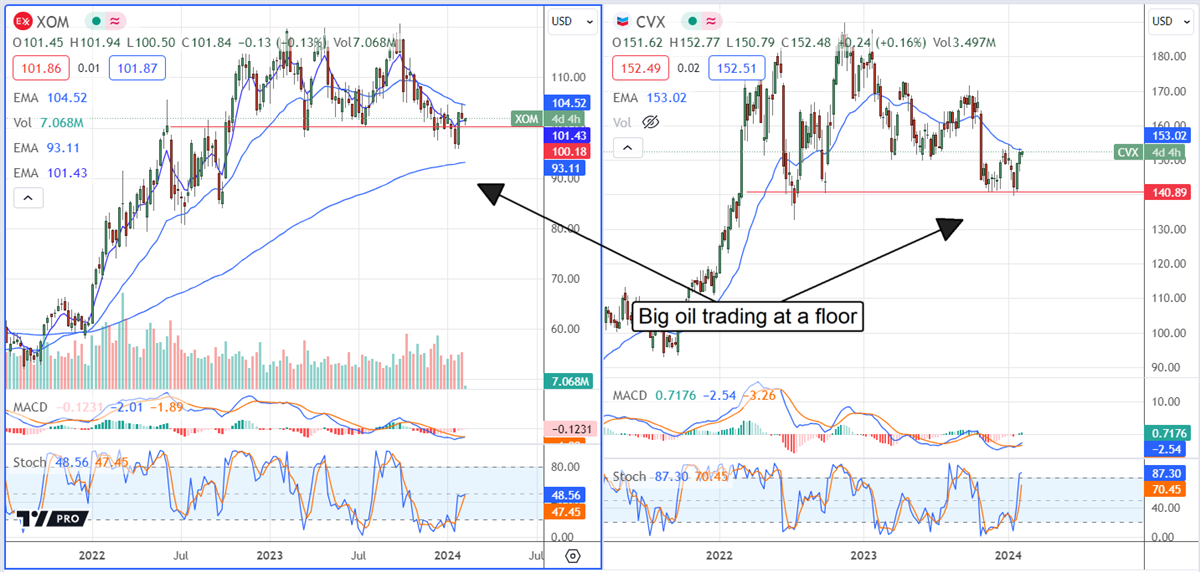
As sketchy as the outlook for oil prices, a floor has been in place for over a year and is unlikely to be broken. Persistent demand and OPEC help to support the price, while rising production drives profits for Exxon Mobil (NYSE: XOM) and Chevron (NYSE: CVX).
Their Q4 results suggest profits, cash flow and capital returns will continue to grow in 2024 and 2025.
Assuming the FOMC does cut rates this year and there isn't a recession, the odds are high that economic activity will accelerate the back half of the year and improve the already robust outlook.
The only difference between the two is that Exxon is the better buy. Simply put, it is twice the size of Chevron and has better operations and superior capital returns, although Chevron is working hard to catch up.
Revenue falls short, but operational quality is improving
Exxon and Chevron reported double-digit declines in revenue that missed the analysts' consensus, but that is about as bad as the news is for these energy companies. The revenues were impacted by one-offs and impairments that are not expected to repeat and had little impact on the bottom line. Each reports favorable production, volume and mix data, providing leverage today and an opportunity for accelerated earnings growth if and when oil prices rebound.
Margin news is favorable for these companies. Their margins fell year-over-year (YoY) due to deleveraging oil prices but are up sequentially. Sequential gains are due to operational and balance sheet improvements that include divesting underperforming assets in favor of growth and green initiatives.
The critical detail from the reports is cash flow. The increase in volume is offsetting the decline in revenue to a degree and allows for substantial cash flow. The cash flow allows for debt reduction, dividends, and share repurchases, which more than double the effective yield, and the yields are substantial. The larger and better-positioned Exxon delivered $32.4 billion in total returns compared to the $26.3 from Chevron, both set records. Exxon reduced its share count by 3.6% and Chevron by 3%.
Analysts see value and yield in the energy sector
Exxon and Chevron offer value trading at 12x this year and 11x next year's earnings while paying 3.7% and 4.3% in dividend yield, respectively. The value is compounded by the analysts' sentiment, which remains firm.
Analysts rate both at "moderate buy" with a consensus price target of 20% to 25% above the current action. The difference is that Exxon's consensus price target is up compared to last year and relatively firm compared to a downtrending target for Chevron. Exxon is also well below the analysts' lowest target, suggesting a deep value. Chevron is trading at the analysts' lowest target.
The technical outlook for Exxon and Chevron is nearly identical. Both peaked in tandem or shortly after the peak in oil prices in 2022 and since retreated to their floor. The floor has been place for over a year and appears to be solid support. Because these stocks are trading at or below the lowest analyst price target, they will unlikely fall below their support levels without a change in the fundamental outlook for production, sales volume or oil prices.
However, the Federal Reserve (the Fed) indicates a higher-for-longer scenario in which the first cuts come later than the market is pricing, and the odds of recession grow. The odds predicted by U.S. Treasury spreads reported by the New York Federal Reserve Bank are trending at the highest levels since 1983 and rising in the near term, up significantly in the last month.





